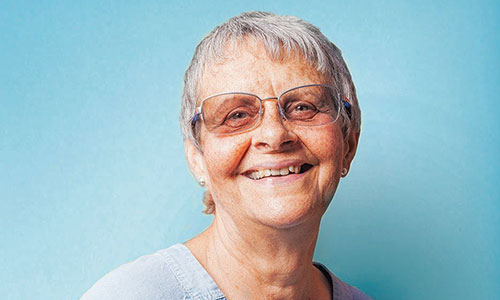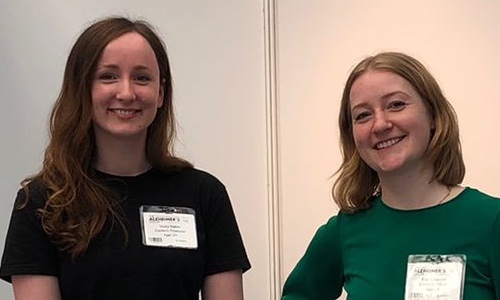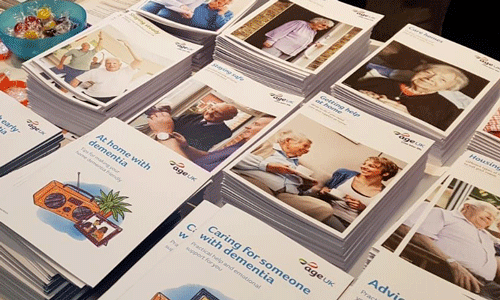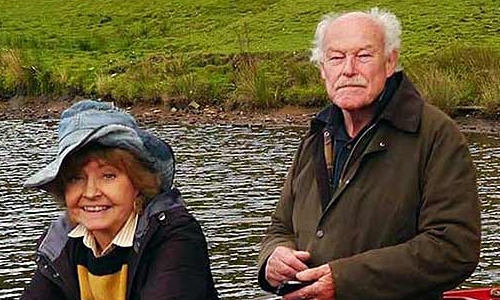Keith Oliver was diagnosed with Alzheimer's disease when he was 55. In the 8 years since, he's presented talks in front of hundreds as an Ambassador for Alzheimer's Society, and has written 3 books. Alzheimer's hasn't won, he tells readers of his latest, 'Dear Alzheimer's: A Diary of Living with Dementia', which is out now.
Here, Keith shares his experience of his diagnosis and how he's stayed positive since, as well as how to live as well as possible with dementia.
The diagnosis
In the early part of 2010 I was a headteacher at a primary school in Kent. I was having some difficulties with my balance – I felt like I was on a ship, and I had started using a stick.
I'd had a few falls and I thought I perhaps had an ear problem. I was finding it much more difficult to concentrate and was becoming tired more easily, so I went to the doctor, thinking they'd put me on antibiotics.
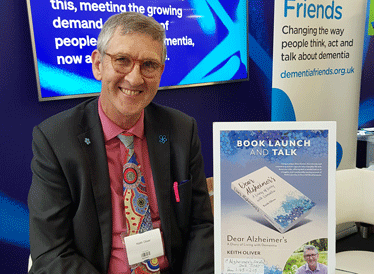
They checked me out and gave me some antibiotics, but they didn't work. Then I had another fall and went back to the doctor, and he sent me for a brain scan.
When the results of the scan were available he said, "Well the good news is, it isn't a brain tumour." That was the first shock. At the time, the doctor hadn't told me that was his suspicion.
The second shock was when they told me the tests suggested I had the early symptoms of Alzheimer's. They referred me to the memory clinic, which carried out more tests and confirmed my diagnosis in December.
After the diagnosis
I had lots of tests and scans to get my final diagnosis. Throughout those tests I was doing my best to score as highly as I could. I had to read a story and answer questions about it, like a comprehension test, and I just didn't have a clue.
I appreciated the honesty of the professionals throughout my diagnosis. I was less happy about there being little sense of what I could do next.
At the time I didn't think about that myself. I just bought into the idea that I was struggling, that I was going to struggle, and that things were going to get worse.
But with hindsight, the people doing the assessments should have been able to use the results to identify where I was still doing OK, and give me strategies to deal with where I was struggling.
Learning about dementia
I thought Alzheimer's was something that only affected the over 70s and was all about memory loss. But I don't think dementia is about memory loss at all, because memory loss is about forgetting.
With Alzheimer's it’s not that you're forgetting, it's that new information isn't going in in a way the person can process it. That's why people with Alzheimer's often have a very good long-term memory but a less effective short-term one.
I always remember what was fabulous and what was really terrible about a day. That's like most people really, but dementia accentuates the good and the bad.
If you're driving along a road and it's a foggy evening, the fog isn't constant – it will be in patches. You'll drive from clear road to hazy to misty and back into clear again, and that's a good way of describing what dementia is like.
Learn about dementia
Read about the condition, how to get care and support, how to plan for the future, and how to live as well as possible.
Getting support
When I was diagnosed, the first people to help were from Age UK. That contact has lasted right up until today.
About the time I was diagnosed it got out to the press and they wanted to run a story about the bloke who was 55 and had Alzheimer's.
Age UK Canterbury found the story and their dementia outreach worker, Judy Ayris, rang me and asked, "Would you like me to come and visit you?" I said yes because no one else had offered.
My wife and I felt it was our first guiding light. I wanted information because I had this sense that information is power, and if I'm going to live with dementia I'm going to have to understand it better.
Judy recommended some literature from Age UK and told me which benefits were available to support us financially. She helped us through all of that, which was a real godsend.
Living as well as possible
The emotions I felt at the time of my diagnosis were shock, surprise and a little bit of fear. But there was also a sense of, "I'm going to deal with this. I'm still young. I'm still feeling reasonably well, physically.
I deal with bad days by writing a lot down. I have 4 diaries to keep track of things. I try to absorb myself in the day I'm living in.
But I'm still a positive person. I'm still attempting to live as well as possible with dementia. I use that phrase because I don't personally like the label 'living well with dementia'.
It's simply not possible to live well every day with dementia, and you get a sense of failure when you don't. So if you say 'live as well as possible', that's a more comfortable place to be.
What keeps me positive is being useful, being busy and being engaged, as well as feeling valued and respected.
My wife is my greatest supporter
My wife Rosemary finds it hard. She will describe herself as my wife and my supporter, and those are labels we're both comfortable with.
The label 'carer' is really important and I completely understand and support it, but I'm also mindful that sometimes it creates impressions that aren't always constructive.
Carer implies there's a dependency from one person to another. Clearly that will happen with the Alzheimer's, but as long as we can avoid that dependency we want to do so.
Ultimately we've tried to maintain normality within our family. We did the power of attorney and my wife and I did our wills. We talked a lot about it for 4 or 5 months but we've not talked about it as much since.
Have you got a will and power of attorney like Keith?
Find out how to safeguard your wishes and protect your family.
Starting to write
As a teacher I was always writing, but I had never considered writing a book. After my diagnosis I saw a course at the local university about life writing and I signed up. I had no ambitions for publishing anything – I just wanted to write something for my family.
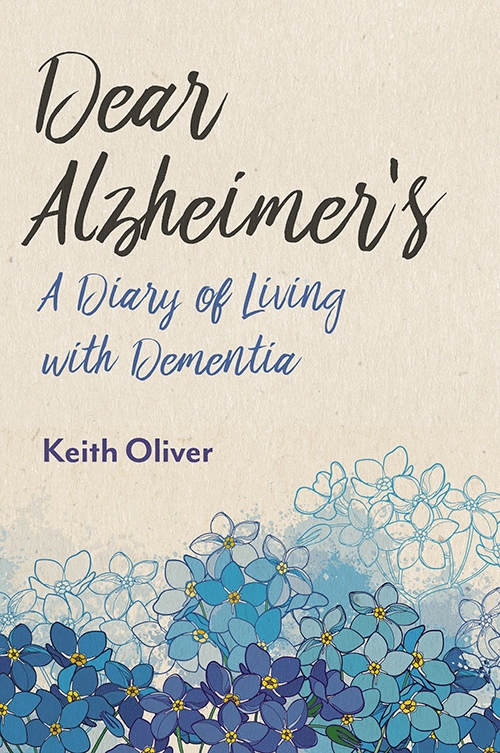
Then we received a grant from the Alzheimer's Society and set up a writing course for 8 people with dementia. We published a book together called 'Welcome to Our World'.
Two years after that I wrote 'Walk the Walk, Talk the Talk', which was a book I wanted to write as a solo project. Shortly afterwards, Jessica Kingsley Publishers contacted me to ask if I'd be interested in writing a book for them. And that’s how 'Dear Alzheimer's' was born.
I knew I'd need a lot more help writing this book than before, and although it's not ghostwritten, I had lots of support from people with the typing as that's a challenge for me now.
I used my diaries and recorded my story on a dictaphone, then gave the dictaphone to friends to type up, a year's worth at a time.
For the letters, I started by writing one from Alzheimer's to myself, but the results were so depressing I immediately left that idea behind. The idea of me writing to Alzheimer's came from a course of compassion-focused therapy, when my therapist asked me to write a compassionate letter to myself.
An extract from 'Dear Alzheimer's: A Diary of Living with Dementia'
Dear Alzheimer's,
Well dementia, in the year since I last wrote to you, it is clear that you've won some rounds but I still feel like I'm winning the bout. It is now over three years since our initial encounter, and damaged though I feel, the damage is repairable with love and support, thus enabling me to search and find positivity in the fog.
I acknowledge that the length of the periods of time during both day and night you are with me is increasing. Even when I try to relax in my armchair in the evening, I need to grasp a cushion for comfort, but this does work, and by the time I rise from my chair, your presence has diminished. What has alarmed me is that you have recruited your toxic cousin, depression, into your armoury. To combat this, I sense the need for those around me, that is, friends and family, to be as positive as possible. [...] Whilst understanding that I need care, what works best for me against you is to be surrounded by caring people, and with their support and love, I see you retreat. [...]
Clinging to the flotsam and jetsam of my mind in mid-ocean, there is a parallel for me; I feel a great sense of freedom when swimming in the ocean, and I thank you that my swimming skills have improved enormously since you came to reside. Things that used to scare me now no longer do so. Unwittingly, you have given me courage, where you wished to bring fear.
Disrespectfully yours,
Keith
Following the progression
Eight years after my diagnosis and on a bad day I'd say I feel very affected by dementia. But on a good day I'd say I don't feel much worse than I did, say, 4 years ago.
I'm quite surprised at how slow the onset has been if I think back to my first conversation with the consultant when she said it could be as little as 6 months until I was into the late stages of dementia.
Everyone is different, but I think the reason her estimate was so out is that she didn't know me. She knew the results of the test and she knew the scan and she knew that things were looking a certain way. What she didn't know about was my determination to live as well as possible, for as long as possible.
Keeping active really seems to have slowed the onset, as well as being involved, maintaining an interest in things, and valuing the people around me. The desire to learn is important, we just have to understand that although we can't retain as much information as we used to, we can retain how the process of learning made us feel. Just like we can remember how our loved ones made us feel, even if we can't remember exactly what we did with them.
 Worried about dementia?
Worried about dementia?
If you're concerned about yourself or someone else, see your GP or call our advice line on 0800 678 1602. We're available 8am – 7pm, 365 days a year.
'Dear Alzheimer's: A Diary of Living with Dementia' is Keith Oliver's story, told through diary format for an insight into day-to-day life with the condition, and interspersed with letters to Alzheimer's. It's published by Jessica Kingsley and is out now in paperback and ebook.



